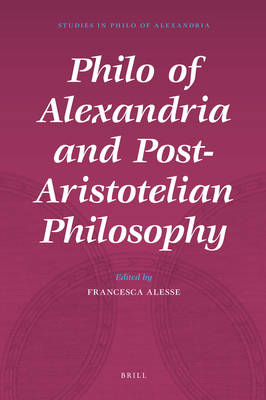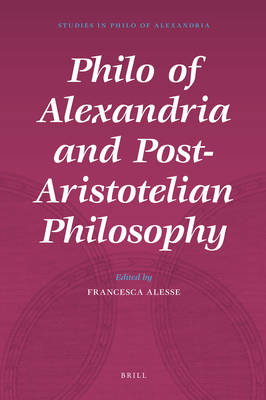
- Afhalen na 1 uur in een winkel met voorraad
- Gratis thuislevering in België vanaf € 30
- Ruim aanbod met 7 miljoen producten
- Afhalen na 1 uur in een winkel met voorraad
- Gratis thuislevering in België vanaf € 30
- Ruim aanbod met 7 miljoen producten
Zoeken
Philo of Alexandria and Post-Aristotelian Philosophy
€ 322,45
+ 644 punten
Omschrijving
The essays collected in this volume focus on the role played by the philosophy of the Hellenistic, or post-Aristotelian age (from the school of the successors of Aristotle, Theophrastus and other Peripatetics, Epicurus, Sceptical Academy and Stoicism, to neo-Pythagorenism and the schools of Antiochus and Eudorus) in Philo of Alexandria's works.
Despite many authoritative studies on Philo's vision of Greek philosophy as an exegetical tool in allegorizing the Scripture, there is not such a comprehensive overview in Philo's treatises that takes in account both the progress achieved in the recent interpretation of Hellenistic philosophy and analysis of ancient doxographical literature.
Contributors: Prof. Dr. David T. Runia, Master of Queen's College, Univ. of Melbourne; Prof. Dr. Robert W. Sharples, University College of London; Dr. Graziano Ranocchia, Fellow-researcher at the University of Würzburg; Prof. Dr. Carlos Lévy, Université Paris IV-Sorbonne; Prof. Dr. Anthony A. Long, University of Berkeley; Prof. Dr. Roberto Radice, Università Sacro Cuore, Milan; Prof. Dr. Gretchen Reydams-Schils, University of Notre Dame, USA; Prof. Dr. Margaret Graver, University of Dartmouth, USA; Prof. Dr. John Dillon, Trinity College, Dublin; Dr. Mauro Bonazzi, Università degli Studi, Milan
Despite many authoritative studies on Philo's vision of Greek philosophy as an exegetical tool in allegorizing the Scripture, there is not such a comprehensive overview in Philo's treatises that takes in account both the progress achieved in the recent interpretation of Hellenistic philosophy and analysis of ancient doxographical literature.
Contributors: Prof. Dr. David T. Runia, Master of Queen's College, Univ. of Melbourne; Prof. Dr. Robert W. Sharples, University College of London; Dr. Graziano Ranocchia, Fellow-researcher at the University of Würzburg; Prof. Dr. Carlos Lévy, Université Paris IV-Sorbonne; Prof. Dr. Anthony A. Long, University of Berkeley; Prof. Dr. Roberto Radice, Università Sacro Cuore, Milan; Prof. Dr. Gretchen Reydams-Schils, University of Notre Dame, USA; Prof. Dr. Margaret Graver, University of Dartmouth, USA; Prof. Dr. John Dillon, Trinity College, Dublin; Dr. Mauro Bonazzi, Università degli Studi, Milan
Specificaties
Betrokkenen
- Uitgeverij:
Inhoud
- Aantal bladzijden:
- 296
- Taal:
- Engels
- Reeks:
- Reeksnummer:
- nr. 5
Eigenschappen
- Productcode (EAN):
- 9789004167483
- Verschijningsdatum:
- 25/06/2008
- Uitvoering:
- Hardcover
- Formaat:
- Genaaid
- Afmetingen:
- 160 mm x 240 mm
- Gewicht:
- 630 g

Alleen bij Standaard Boekhandel
+ 644 punten op je klantenkaart van Standaard Boekhandel
Beoordelingen
We publiceren alleen reviews die voldoen aan de voorwaarden voor reviews. Bekijk onze voorwaarden voor reviews.







